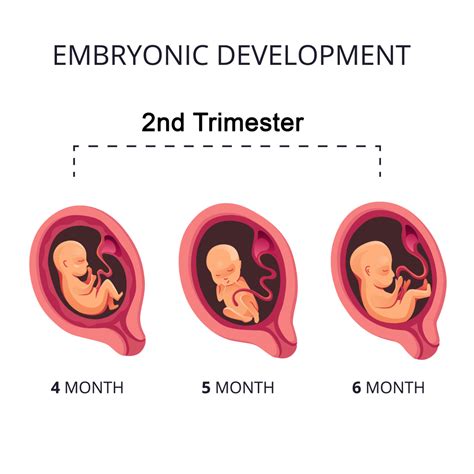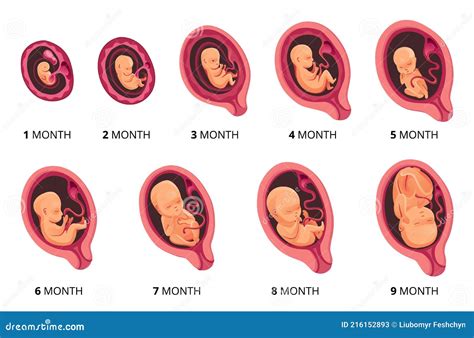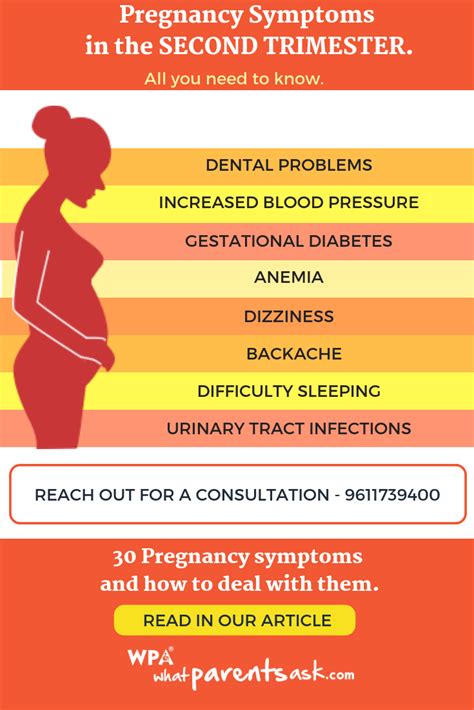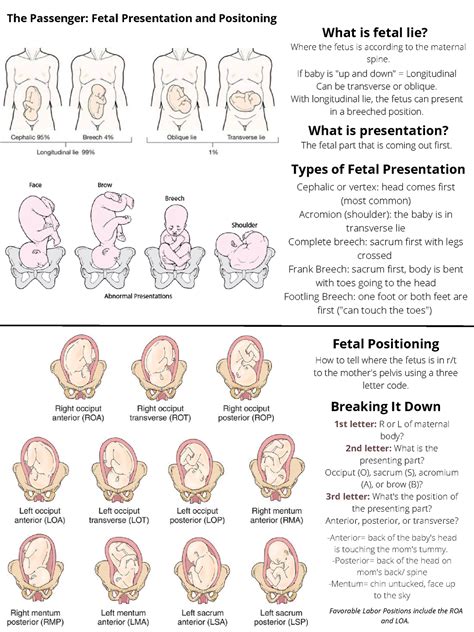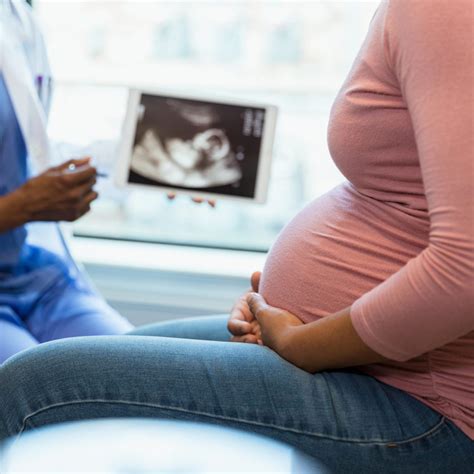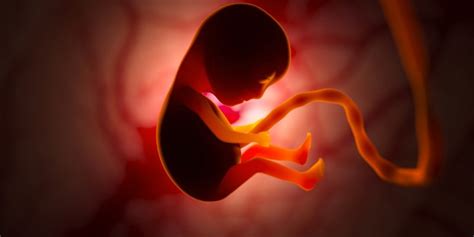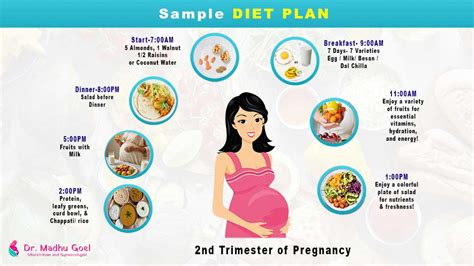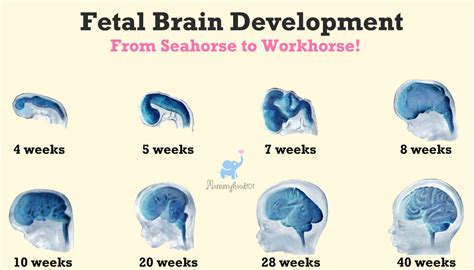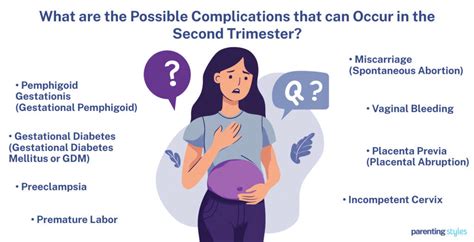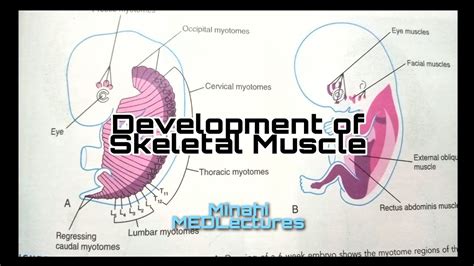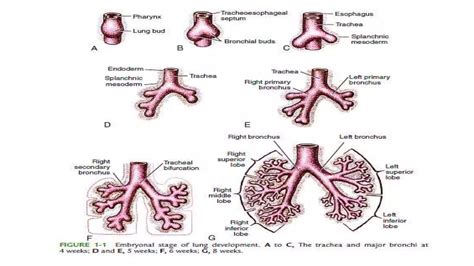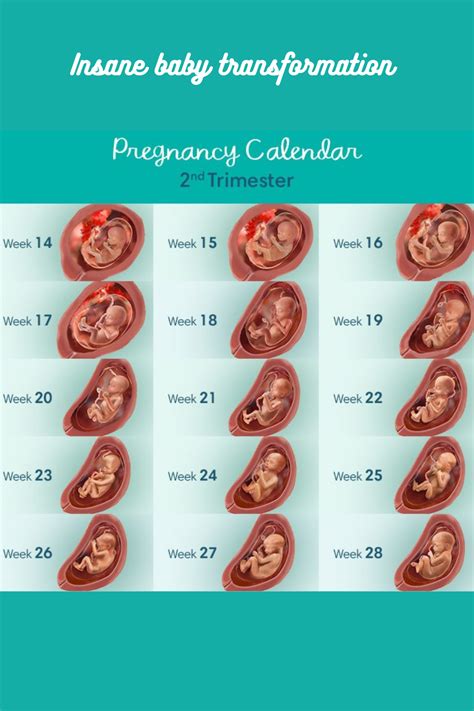The second trimester of pregnancy, which spans from week 13 to week 26, is a crucial period of fetal development and growth. During this time, the fetus becomes more active, and the mother may start to feel its movements. The second trimester is also a period of significant physical and emotional changes for the mother, as her body adapts to the growing fetus.
As the second trimester begins, the morning sickness and fatigue that were common in the first trimester may start to subside, and the mother may experience a surge in energy and a sense of well-being. However, this period is also marked by significant physical changes, such as a growing belly, back pain, and stretch marks. The mother's body is undergoing numerous changes to accommodate the growing fetus, and it's essential to prioritize self-care and maintain a healthy lifestyle.
The second trimester is also a critical period for fetal development. The fetus's major organs and body systems are functioning, and its senses are becoming more refined. The fetus can now detect light, sound, and even taste, and its brain is developing rapidly. The mother may start to feel the fetus's movements, such as kicking, rolling, and even sucking its thumb. This period is also essential for the mother to bond with her baby, as she can start to feel a sense of connection and attachment.
Second Trimester Pregnancy Overview
The second trimester is divided into three months, each with its unique characteristics and milestones. During this period, the mother will have regular prenatal check-ups to monitor the fetus's growth and development. The healthcare provider will also perform various tests, such as ultrasound scans and blood tests, to ensure the mother and fetus are healthy.
Week 13-14: Fetal Development
At week 13-14, the fetus is approximately 3-4 inches long and weighs around 1-2 ounces. Its major organs, such as the heart, lungs, and liver, are functioning, and its senses are becoming more refined. The fetus can now detect light, sound, and even taste, and its brain is developing rapidly. The mother may start to feel the fetus's movements, such as kicking and rolling.
Second Trimester Symptoms
During the second trimester, the mother may experience a range of symptoms, including:
* Back pain and pelvic pressure
* Stretch marks and skin changes
* Breast tenderness and nipple darkening
* Fatigue and mood swings
* Food cravings and aversions
* Heartburn and indigestion
* Frequent urination and constipation
Week 15-16: Fetal Movement
At week 15-16, the fetus is approximately 4-5 inches long and weighs around 2-3 ounces. The mother may start to feel the fetus's movements more pronouncedly, such as kicking, rolling, and even sucking its thumb. The fetus's skin is starting to thicken, and its fat layers are forming, which will help regulate its body temperature after birth.
Prenatal Care During the Second Trimester
During the second trimester, prenatal care is crucial to ensure the mother and fetus are healthy. The healthcare provider will perform regular check-ups, which may include:
* Ultrasound scans to monitor fetal growth and development
* Blood tests to check for gestational diabetes and other conditions
* Urine tests to check for protein and glucose levels
* Blood pressure checks to monitor for preeclampsia
* Fetal heart rate monitoring to check for any abnormalities
Week 17-18: Fetal Sensory Development
At week 17-18, the fetus is approximately 5-6 inches long and weighs around 3-4 ounces. Its senses are becoming more refined, and it can now detect light, sound, and even taste. The fetus's skin is sensitive to touch, and it can feel the mother's movements and emotions.
Second Trimester Nutrition and Lifestyle
During the second trimester, it's essential for the mother to maintain a healthy lifestyle, including:
* Eating a balanced diet rich in fruits, vegetables, whole grains, and lean proteins
* Staying hydrated by drinking plenty of water
* Engaging in regular exercise, such as walking, swimming, or prenatal yoga
* Getting enough sleep and practicing stress-reducing techniques, such as meditation or deep breathing
* Avoiding harmful substances, such as tobacco, alcohol, and caffeine
Week 19-20: Fetal Brain Development
At week 19-20, the fetus is approximately 6-7 inches long and weighs around 4-5 ounces. Its brain is developing rapidly, and it's starting to produce vital hormones that will help regulate its body functions after birth. The fetus's nervous system is also maturing, and it's starting to develop reflexes, such as sucking its thumb.
Second Trimester Complications and Risks
During the second trimester, there are several complications and risks that the mother and fetus may face, including:
* Gestational diabetes
* Preeclampsia
* Placenta previa
* Fetal growth restriction
* Preterm labor
* Miscarriage
Week 21-22: Fetal Muscle Development
At week 21-22, the fetus is approximately 7-8 inches long and weighs around 5-6 ounces. Its muscles are developing, and it's starting to practice movements, such as kicking and rolling. The fetus's skin is also starting to thicken, and its fat layers are forming, which will help regulate its body temperature after birth.
Second Trimester Emotional and Mental Health
During the second trimester, the mother may experience a range of emotions, including:
* Excitement and anticipation
* Anxiety and fear
* Mood swings and irritability
* Depression and sadness
* Bonding and attachment to the fetus
Week 23-24: Fetal Lung Development
At week 23-24, the fetus is approximately 8-9 inches long and weighs around 6-7 ounces. Its lungs are developing, and it's starting to produce surfactant, a substance that will help its lungs expand and contract after birth. The fetus's nervous system is also maturing, and it's starting to develop reflexes, such as sucking its thumb.
Second Trimester Preparation for Parenthood
During the second trimester, it's essential for the mother and her partner to prepare for parenthood, including:
* Attending prenatal classes and workshops
* Reading books and online resources about pregnancy and parenting
* Joining online communities and support groups
* Preparing the nursery and baby's essentials
* Discussing parenting styles and expectations
What are the most common symptoms of the second trimester?
+
The most common symptoms of the second trimester include back pain, pelvic pressure, stretch marks, breast tenderness, and fatigue.
How often should I attend prenatal check-ups during the second trimester?
+
It's recommended to attend prenatal check-ups every 4-6 weeks during the second trimester, or as advised by your healthcare provider.
Can I exercise during the second trimester?
+
Yes, it's recommended to engage in regular exercise during the second trimester, such as walking, swimming, or prenatal yoga, to maintain physical and mental health.
As the second trimester comes to a close, the mother and fetus are preparing for the final stretch of pregnancy. The mother's body is undergoing significant changes, and the fetus is developing rapidly. It's essential to prioritize self-care, maintain a healthy lifestyle, and prepare for parenthood during this critical period. By staying informed and seeking support, the mother and her partner can navigate the second trimester with confidence and excitement, anticipating the arrival of their new baby. We encourage you to share your experiences and thoughts about the second trimester in the comments below, and don't forget to share this article with anyone who may be going through this incredible journey.
